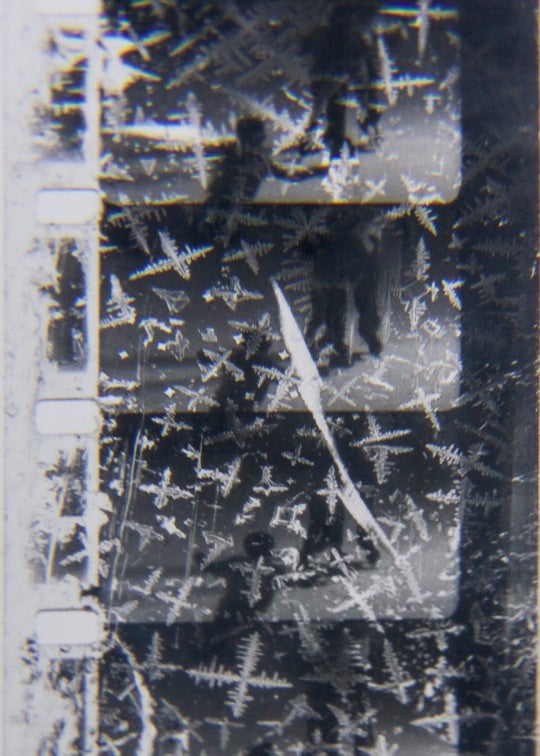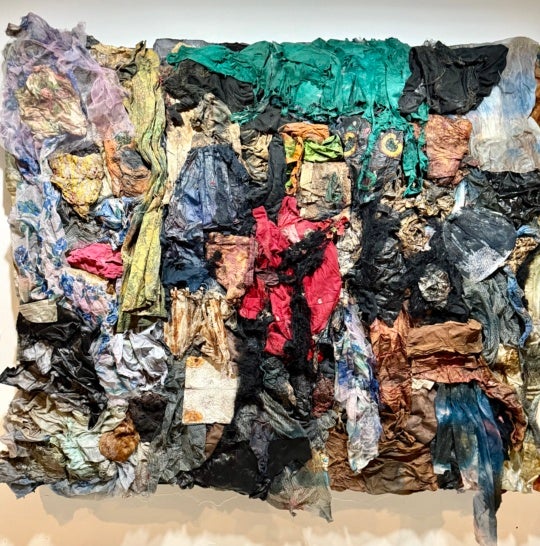[cont.]
As Tommy sort of wobbled toward the door with Dennis for support, she walked toward the illuminated pool and all of the reflected sparkles of light on the web of glass above. She had never seen so very many celebrities packed in together in person before. Even the folks she didn’t quite recognize looked very important. There was no point in introducing herself, though. The two or three who did collect art and the five or six who attended art openings were not in the crowd. That’s what limited the Los Angeles art scene, keeping it from really rivaling New York: the entertainment industry people didn’t buy art. Ultraconservative Wall Street brokers collected art as one of the trappings of wealth but liberal entertainment industry bigwigs saw no need to support any local art form other than their own.
“Odessa, must you leave so soon? The main performers are just setting up on the balcony.” Rina was positively regal in gold. Her words, however, were so hollow and empty of inflection that they could have been prerecorded.
“I’m taking Tommy home before he does anything distasteful on your floor. Open bars and young artists don’t mix real well.”
“He’s not your responsibility.”
“I know but…”
“Well, you were so kind to come.”
“Rina, you were kind to invite me and introduce me to your friend. I’ve already set up a studio visit with her. And I do apologize for the unfortunate scene with that writer.”
“I don’t understand what’s gotten into him tonight. I’ve watched him pick fights with two other women. He’s usually so gracious and funny, the life of the party.”
“Hitting the bottle so hard definitely doesn’t bring out his good side.”
But Rina wasn’t listening to her. She was looking in the direction of her famous husband with his arm around his redheaded assistant, nuzzling her, holding her tight.
Two
On that warm Friday morning, Rina drove her two daughters to school. Most of her friends had their nannies handle this daily chore; she, however, made a point of doing it herself without fail. She expertly inched the immaculate German minivan through the heavy traffic to the private academy where her older daughter, Barbara, was a senior. Barbara did not tell her mother goodbye as she left the van. She never did. She leaned into the front seat to bop her little sister on the shoulder and slammed the sliding door shut. The slamming always bothered Rina and thus was reserved for punishment. Rina had made the mistake the night before of suggesting that Barbara refrain from listening to the music plugged directly into her ears quite so loudly. She endeavored to explain that hearing loss was a genuine problem, a non-reversible injury. Barbara had stared her straight in the eyes, dismissing her: “Get a grip. Everyone’s doing it, Ma. Everyone.”
That morning was different, though, not because of the door – Barbara was perpetually angry – but because her younger daughter, her baby, her darling, did not hug her goodbye, did not chirp “see you later alligator.” She too left the car without a word and, like her big sister, slammed the door shut. Her baby, her darling girl, behaving like the rest of them.
Suddenly Rina felt very tired. Some days her happy pills weren’t enough.
Their behavior really was her husband’s fault. Her intent was to raise her daughters to be self confident women, to stand their ground and know their minds, yet be gracious. Graciousness made life so much easier for women. It had never occurred to her that both girls might end up treating her as rudely as their father. By the time Barbara reached five, Rina acknowledged the impossibility of imparting manners and politeness to her. This child was a miniature clone of her husband, stubborn, intense and deceptive. By that theory of chromosomes – wasn’t it Mendel with his peas? – one offspring was supposed to be like her. Maybe gentility was a recessive gene like her pale blue eyes. Jenna, her baby with the gorgeous gold curls and deep brown eyes, was hers no more.
Rina pulled into a side street lined with eucalyptus and jacaranda trees and sat there with the car running, the speakers still churning out her daughters’ tunes. She turned the music off to call work. The administrative assistant she now shared with four other curators because of budget cuts answered. “I am not feeling well,” she told the young woman. “I won’t be coming in today.” The young woman, new to the job, did not recognize how unusual this was. She simply projected that Rina wanted a longer weekend.
The assistant didn’t know that Rina’s job had become a sanctuary for her. She was the associate curator of eighteenth century art, specializing in the era which included Canova and David. Except for these two greats, no one admired these neoclassical artists anymore; no one remembered their names. So many were underrated geniuses, unfairly confined to storage. She saw their worth, however, and reveled in the symmetry and sense of order of the compositions, in the belabored narratives they illustrated, the volumes of footnotes any description required. Years ago, right after she was married, she tried to explain to her husband that she admired his architectural designs for the same reasons. Nothing was left to chance in his buildings, every inch had a purpose. He had been offended and informed her he was not impressed by the dead. Of course, that wasn’t true. His heroes – Schindler, Neutra, Gill – were all quite dead.
She drove straight home and parked the van on the far side of the garage. After opening a couple of cabinet doors, she found the broom and swept the area where her husband parked his Jaguar, carrying the leaves and dirt and a stray receipt for cigars to the trash receptacle. He had complained about the mess as he left the house, as if she had deliberately brought in the leaves and left them exactly there. Without changing her clothes, she pulled out the vacuum cleaner from the cleaning closet and fumbled until she figured out how to turn it on. She vacuumed the imagined bits of dust in the entryway on the dismal grey carpeting and decided that vacuuming wasn’t worth her time. No one would notice. Jenna had mentioned an absence of socks so she found her way into the laundry room, rummaged through the pile and decided Jenna was old enough to fend for herself. Jenna had insisted this year that she didn’t need a nanny, that she was a big girl. Now she would have an opportunity to prove it. But Rina did need to do something for them, something they would remember.
She doubted they would even notice if she made their beds. What would catch their attention? She decided to cook. She had always enjoyed chopping vegetables, the sound of the knife hitting the wood. Barbara was a vegan and had to have separate meals. Rina thought about making a pot of lentils with spices and tomatoes, minced carrots and wild rice. No onions. Barbara did not like onions. Her husband liked beef and ate a thick slice still bleeding. He made a point at every meal of telling Barbara how delicious it was and she called him a barbarian. It was a game to them. She did not need to fix meals for him. The freezer was filled with custom cut steaks. Jenna, her baby, was lactose intolerant, allergic to peanuts, wheat, tomatoes and eggplant. Their maid had already fixed meals for them, though, each carefully labeled in the freezer. What was the point of cooking? She decided to rearrange the furniture instead, moving each piece where she thought it fit. The furniture was his. He selected each piece and positioned them all so they didn’t interfere with the architecture. This really was his home, his edifice, and she just lived there, a candle at his altar. Moving furniture, though, would merely seem petulant.
Rina washed her hands and stood by the sink for a few minutes, gazing at the view of the mountains covered in a patchwork of bright green as she massaged lotion onto her hands. When they first moved into the house, the hills had few buildings, no swimming pools or manicured lawns and stood starkly gold against the sky. It was prettier now at night with all the lights. Everything changes and it was her habit to find the positive in that. That, unfortunately, was not always possible. She could see the lines developing around her mouth in her reflection and traced the creases between her eyebrows with her finger. No matter how she tried to get rid of them, these lines came back. She did not want to live through the discomfort of another round of cosmetic surgery, the swollen eyes, the disfigurement. It was pointless anyway. Roger wouldn’t even notice.
The maid was gone, off on some family emergency in Honduras or was it Nicaragua? Her daughters would be playing in a soccer game after school. Her friend’s daughter also participated. Tonight was the friend’s turn to pick them all up and haul them home. Her husband would be back home before they arrived. He could take care of feeding them.
She went into the bathroom, touched up her makeup and pulled out all of her husband’s sleeping pills. She counted sixty eight of them, the remnants of four different prescriptions – blue circles, yellow caplets, pink diamonds, red and turquoise caplets, not quite a rainbow. It took both hands to carry them out across to the far side of the great empty hall, to the lovely view through the tall French doors. Glancing through the glass doors at the steel fountain spewing water into the square pool, she placed the pills neatly in a pile on the glass end table and poured herself a stiff shot of single malt Scotch from the crystal decanter. Her daughters would be sorry they didn’t love her.
She drank the Scotch slowly, deliberately, and poured another, placing the glass beside the flawless Eames sofa her husband loved so much. Their honeymoon had been delayed so that he could buy that sofa. That was before he became comfortable spending her money. Pulling the pale steel grey cashmere throw over herself and tucking it under her feet, she swallowed the pills a handful at a time between sips of Scotch until they were all gone. She stretched out, her head nestled in a plump silk pillow, and stared at the spray of water from the fountain evaporating in the dry air, smiling smugly to herself.
There are drugs for anxiety, for hypertension, for pain, for inducing sleep or labor or comas. There are even drugs which can, for some, abate depression. There is no pill available for self pity.
………………………..
Return on Friday for the next chapters of Just Like Suicide.




